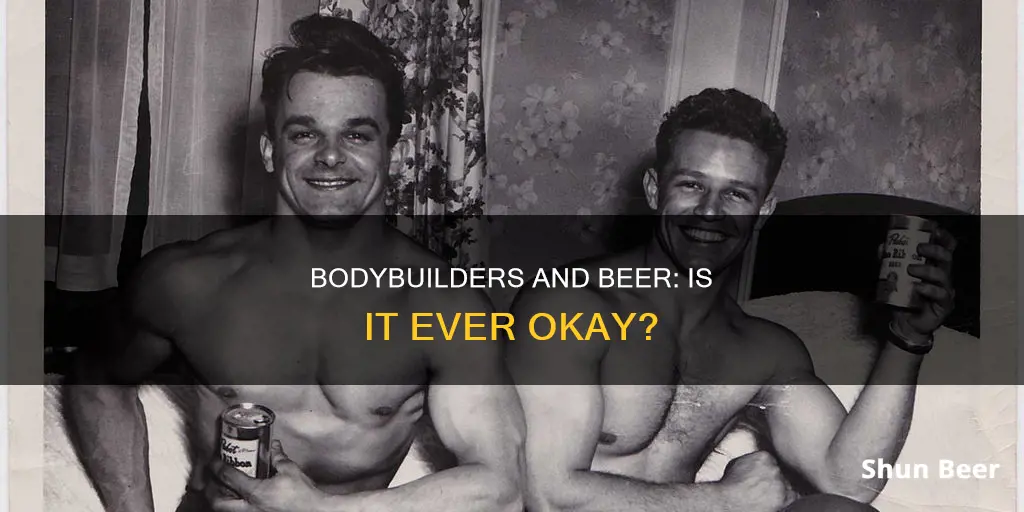
Drinking alcohol is a common way to unwind, but what about if you're a bodybuilder? Is it ever OK to drink beer when you're focused on building muscle? The answer is yes, but only in moderation. Beer is often handed out at the end of marathons, and many fitness professionals enjoy a beer or two. Beer is rich in energy-promoting B vitamins and quickly absorbed carbs, and it can help you stick to your fitness routine by encouraging socialising. However, these benefits are only associated with moderate drinking, defined as one beer per day. Drinking more than this can lead to dehydration, weight gain, disrupted muscle growth, and poor sleep – all of which can hinder your bodybuilding goals. So, if you're a bodybuilder, it's best to limit yourself to one beer now and then and make sure you stay hydrated and get enough sleep.
| Characteristics | Values |
|---|---|
| Alcohol consumption | Even moderate alcohol consumption can take a toll on bodybuilders' health and progress |
| Muscle protein synthesis | Alcohol consumption inhibits muscle protein synthesis |
| Dehydration | Alcohol is dehydrating |
| Muscle performance | Alcohol impairs the central nervous system, reducing control and reaction time during physical exercise |
| Calories | Alcohol is high in calories and can contribute to weight gain |
| Muscle growth | Alcohol may disrupt muscle growth |
| Sleep | Alcohol can interrupt sleep, which is important for muscle growth |
What You'll Learn

Beer is rich in B vitamins and quickly absorbed carbs
Beer is often viewed as detrimental to bodybuilding, and while it does have some negative effects, it can be enjoyed in moderation as part of a balanced diet and fitness routine. Beer is rich in B vitamins and quickly absorbed carbs, which can offer some benefits to bodybuilders.
B vitamins are essential for cell function and energy metabolism. They play a crucial role in converting the energy from food into a form that our bodies can use and support oxygen transport. Additionally, B vitamins help maintain skin cells, brain cells, and body tissues, as well as repair damaged muscles and improve recovery time. A typical serving of beer (12 ounces) can contain up to 14 grams of carbohydrates, making it a decent option for replenishing energy after an intense workout.
However, it is important to note that excessive alcohol consumption can deplete the body's B vitamin stores. Therefore, moderation is key when it comes to drinking beer, with one beer per day being the recommended limit. Additionally, it is crucial to fuel the body with a balanced diet and proper nutrition to support muscle growth and overall health.
While beer can provide a good source of B vitamins and carbs, it is not a substitute for a well-rounded diet rich in various nutrients. Bodybuilders should ensure they are consuming a variety of whole foods, including lean proteins, complex carbohydrates, healthy fats, and abundant micronutrients, to support their fitness goals and overall health.
In conclusion, beer can be a refreshing treat after a workout, offering some nutritional benefits in the form of B vitamins and quickly absorbed carbs. However, moderation is key, and it should be enjoyed as part of a balanced diet and healthy lifestyle.
Drinking NA Beer While on Plavix: What You Need to Know
You may want to see also

Beer won't harm hydration
While it's a well-known fact that alcohol is a diuretic, meaning it increases urine output, and can therefore be dehydrating, evidence suggests that beer—especially low-alcohol beer—may not have a negative impact on hydration.
A study published in the Journal of Applied Physiology found that beverages with low alcohol concentrations have a negligible diuretic effect when consumed in a state of exercise-induced dehydration. This means that hydrating with water or a low-alcohol beer (around 2% ABV) is effectively the same. The study also found that a 4% ABV beer had the same hydrating qualities but took longer to achieve the same results.
Another study compared the effects of beer, wine, spirits, and their non-alcoholic counterparts on urine output. It found that the stronger alcoholic drinks had a short-term diuretic effect, but that urine output after drinking a typical beer was no different than after a non-alcoholic beer or water.
Several other studies have come to similar conclusions: that beer might actually hydrate us adequately, and that a weak beer will likely do a better job of keeping your hydration levels topped up than drinking higher ABV wine or spirits. However, it's important to note that these studies do warn that stronger beers are likely to be more dehydrating, and that drinks containing essential electrolytes are still better for hydration.
So, while beer won't harm hydration in moderation, it's important to be mindful of the alcohol content and opt for lower ABV options when possible. It's also a good idea to alternate alcoholic drinks with water to stay hydrated and avoid the negative effects of dehydration, such as a hangover.
Diabetics and Rolling Rock Beer: Is It Safe?
You may want to see also

Alcohol interrupts sleep
Alcohol and bodybuilding do not go hand in hand. This is because alcohol can negatively impact muscle growth and definition, and interrupt sleep, which is essential for muscle recovery.
Sleep is a critical time for bodybuilders as this is when the body repairs and regenerates muscle tissue, and produces hormones that aid in muscle growth and repair. Alcohol can disrupt this process in several ways. Firstly, it can cause sleep disturbances, interrupting the deep, restorative sleep that is essential for muscle recovery. Alcohol can also lead to dehydration, which can impact sleep quality and further hinder the muscle recovery process.
When alcohol is consumed, it disrupts the natural production of hormones that are crucial for muscle growth and repair. Testosterone, for example, is essential for building and maintaining muscle mass, and alcohol consumption can result in decreased testosterone levels, hindering muscle growth. Additionally, alcohol can negatively impact protein synthesis, which is the process by which the body uses protein to repair and build muscle tissue.
Alcohol can also lead to an increase in cortisol levels, often referred to as the 'stress hormone'. Cortisol has a catabolic effect on muscle tissue, meaning it breaks down muscle protein, which is counterproductive to the anabolic processes bodybuilders strive for.
The impact of alcohol on sleep and hormone production can therefore significantly hinder the body's ability to recover and build muscle, conflicting with the goals of bodybuilding. As such, bodybuilders tend to avoid alcohol, especially during training, to optimise their sleep quality and physical performance.
Drinking Beer While on Buspar: What You Should Know
You may want to see also

Beer contributes to weight gain
Beer is a drink that has been enjoyed by humans since prehistoric times, but it can also be a contributing factor to weight gain. Here are some reasons why beer consumption may lead to weight gain:
Calorie Intake and Fat Burning
Beer contains a significant number of calories, with a 12-ounce serving ranging from 60 to 150 calories, depending on the brand. Alcohol itself contains about seven calories per gram, which is higher than carbohydrates and protein. When you consume beer, you're taking in these calories in addition to those from other dietary sources. This can promote a positive energy balance, leading to weight gain over time. Additionally, drinking alcohol can prevent your body from burning fat. Your body prioritizes breaking down alcohol over other sources of fuel, including stored fat. Regular drinking may contribute to an increase in body fat, especially if consumed in large quantities.
Appetite and Cravings
Beer can increase your appetite and make you feel hungrier. Studies have shown that consuming alcohol before or during a meal does not reduce the amount of food eaten and may even lead to increased intake. Beer also tends to lead to cravings for salty and greasy foods, further adding to your calorie intake.
Hormonal Changes
The hops used in beer are high in phytoestrogens, plant compounds that can mimic the female sex hormone estrogen. It is suggested that these phytoestrogens may cause hormonal changes in men, increasing their risk of storing belly fat. Additionally, alcohol consumption can lower testosterone levels, which is another factor that may increase the risk of weight gain, especially around the belly.
Health Risks
Excessive alcohol consumption is linked to various health risks, including high blood pressure, insulin resistance, heart disease, stroke, liver disease, and certain types of cancer. These health conditions can further complicate weight management and overall well-being.
While moderate consumption of one beer per day may not significantly impact weight gain, excessive drinking or binge drinking can lead to weight gain and adverse health effects. It is important to monitor your alcohol intake and maintain a balanced diet and active lifestyle to maintain a healthy weight.
Energy Drinks vs Beer: Which is More Harmful?
You may want to see also

Beer is dehydrating
Beer is a natural diuretic, which means it causes you to urinate more than you usually would. This is because alcohol suppresses the production of the anti-diuretic hormone (ADH), which helps the body maintain sodium balance. With less ADH, your kidneys create more urine. This can increase the risk of dehydration as your body loses fluids.
Alcohol also dehydrates the body as it increases the urine produced by your kidneys to process and filter it out of your body. This is why people often urinate more frequently when drinking beer.
Losing fluids can also offset your electrolyte levels. As beer is a diuretic, you lose water, affecting your fluid balance. Losing more fluid than you take in can deplete your electrolyte levels, leading to dehydration. Even if you're drinking lots of water, your system craves more than just water when your electrolytes are off balance.
The higher the ABV, the harder your body has to work to rid itself of the alcohol. It can take up to six hours for alcohol to leave your system and be filtered out by your kidneys.
However, some studies suggest that the diuretic effect of alcohol is blurred when the body is dehydrated. One study found that non-alcoholic beer, low-alcoholic beer, and water resulted in fluid retention of 36%, 36%, and 34% respectively, while 5% beer retained 21% of fluid.
Mastering Beer: CFT Mastercan's Magic
You may want to see also
Frequently asked questions
Drinking beer can be detrimental to bodybuilding as it is an alcoholic beverage that can negatively impact body composition, sports performance, and a balanced diet. It is also dehydrating, disrupts muscle growth, and can lead to weight gain. However, some bodybuilders do still choose to drink beer in moderation.
Alcohol consumption, even in moderate amounts, can inhibit muscle protein synthesis for up to 12 hours after drinking. This can lead to increased body fat and decreased muscle mass, despite working out.
As a diuretic, alcohol increases urine production, leading to dehydration. This can impact the body's hydration levels during and after workouts, making it more difficult to maintain hydration.







